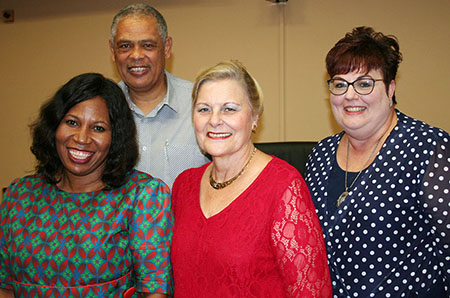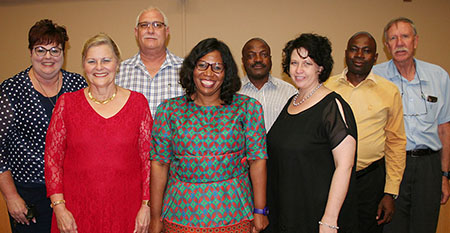Handling change and facing challenges are certainties in South Africa and range from coping with changes in our everyday world to facing severe trauma.
Prof Minrie Greeff, head of the Ethics Office of the Faculty of Health Sciences at the North-West University (NWU), was the speaker at the 14th public lecture hosted by Prof Refilwe Phaswana-Mafuya, the deputy vice-chancellor for research and innovation.
Prof Greeff said academics are realising the answers and solutions they previously had no longer “jell”. “We find ourselves having to find new creative and innovative answers to complex situations, issues and problems.” Quoting Conklin, she said “our tools are not picking up the dirt” anymore.
“Transdisciplinarians coined these as ‘wicked problems’ that are difficult to be handled by one discipline only. Due to variations in problems and challenges academics have to sometimes move from a monodisciplinary functioning to a more team based approach.”
Prof Greeff said a variation of terms developed over time to describe these differences in functioning created confusion. The terms pluridisciplinarity, monodisciplinarity, multidisciplinarity, interdisciplinarity, and transdisciplinarity were used interchangeable yet they have significant differences.
She managed to crack these terms and clarify each for its intended purpose, and then focused on trandisciplinarity and transdisciplinary research as a way to tackle these “wicked” problems.
She described the transdisciplinary team approach as a flexible way various disciplines collaborate and negotiate with other disciplines and non-academics to achieve integration of knowledge and cohesion. This, said Prof Greeff, was achieved by transcending disciplinary boundaries in finding holistic innovative and practical ways of thinking and engaging with the complexities of people or society in terms of real life societal problems to improve society and advance the common good by bridging science and practice.
“Transdisciplinary research supports an ethics of shared knowledge and a shared understanding based on an absolute respect for the collective and individual otherness. The approach is problem-focused, demand-driven and pragmatic with the emphasis to solve problems at the interface of science, technology and society, which goes beyond the confines of academia.
“The inclusion of non-academics becomes an essential part of transdisciplinary research. The career journey of transdisciplinary researchers is difficult as they are faced with career development issues and funding as they do not typically fit the systems and structures prescribed by our present day academic institutions,” she said.
Prof Greeff said that more and more transdisciplinary researchers are searching for ways of providing the value and evidence to support the effectiveness of this type of research. The biggest challenge is to link societal change to the transdisciplinary research process. She said it became difficult to assess social impact due to the problem of causal attribution and the time lag that typically occurs between the time of knowledge production and the moment of impact.
She used Holzer’s (2017) six stage framework for assessment of to give some guidance and concluded with the typical profile of a transdisciplinary researcher: being grounded in a discipline but open to access another, the willingness to surrender individual interest, certain personality and attributes, and the inherent respect for the “other” and the ability to truly transcend disciplinary boundaries.
• The Africa Unit for Transdisciplinary Health Research (AUTHeR) in the Faculty of Health Sciences is one of only six research units in the world that emphasises transdisciplinary research. It is also the only such unit in Africa.
A dedicated transdisciplinary research unit such as AUTHeR is a unique phenomenon at universities worldwide.

Attendees at the 14th Public Lecture at the NWU are Prof Rifilwe Phaswana-Mafuya, Deputy Vice-Chancellor: Research and Innovation, Prof Lloyd Conley, executive dean of the Faculty of Education; Prof Minrie Greeff, head of the Ethics Office of the Faculty of Health Sciences, and Prof Jeanetta du Plessis, Deputy Dean: Research and Innovation, Faculty of Health Sciences.

From left are Prof Jeanetta du Plessis, Deputy Dean: Research and Innovation in the Faculty of Health Sciences, Prof Minrie Greeff, head of the Ethics Office of the Faculty of Health Sciences, Prof Awie Kotzé, executive dean of the Faculty of Health Sciences, Prof Refilwe Phaswana-Mafuya, Deputy Vice-Chancellor: Research and Innovation, Prof David Modise, Deputy Dean: Research and Innovation in the Faculty of Natural and Agricultural Sciences, Prof Liezl van Dyk, executive dean of the Faculty of Engineering, Prof Washington Dudu, Deputy Dean: Research and Innovation in the Faculty of Education, and Prof Frans Waanders, director of the Centre of Excellence in Carbon-based Fuels.
